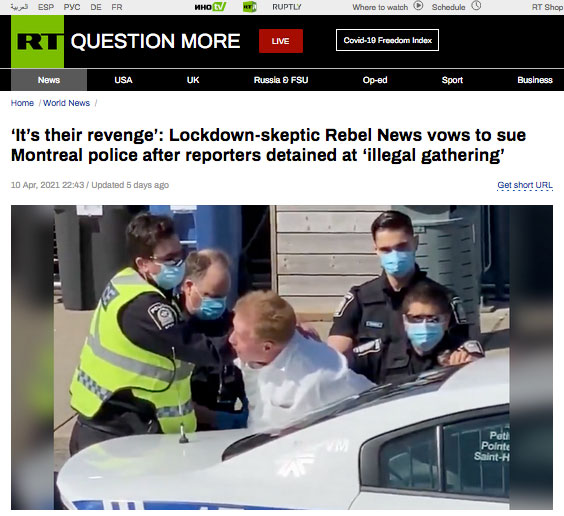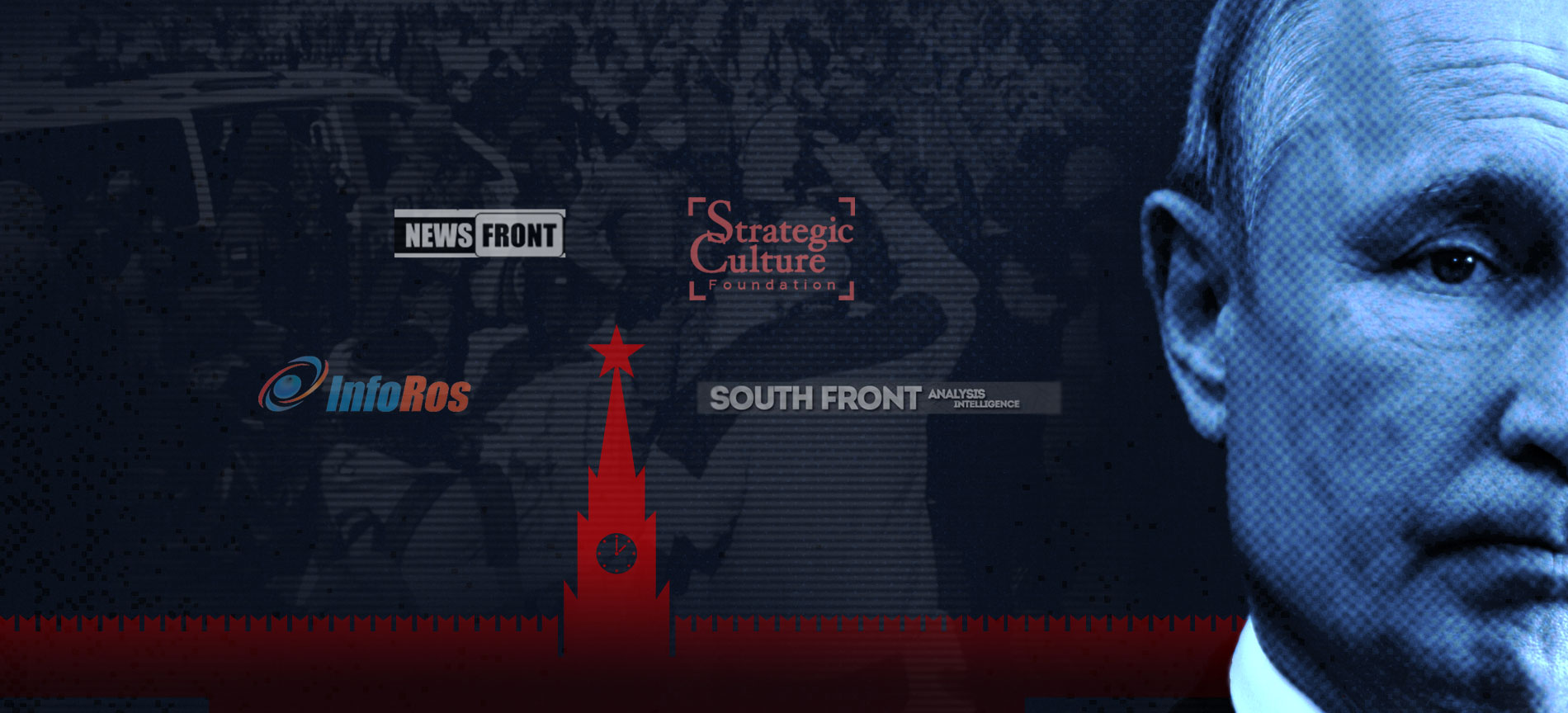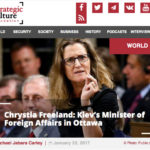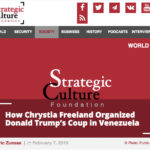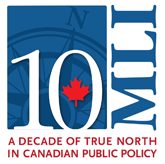US Places Sanctions on Russian Disinformation Platforms That Have Targeted Canada
If there was ever any doubt about whether the Russian government and its intelligence agencies have targeted Canada with disinformation, they have now been utterly dispelled. Four media platforms have been placed on the US sanctions list after having been identified as being under the control of Russian intelligence services.
DisinfoWatch’s analysis of the content published on these platforms indicates that they have published stories discrediting Canadian elected officials from Stephen Harper to Chrystia Freeland and Justin Trudeau. They circulated disinformation intended to marginalize Canada’s Ukrainian and Baltic communities and promote conspiracies and false narratives intended to polarize Canadians. Anti-NATO headlines and stories are intended to erode trust in the alliance and between members in order to break apart the transatlantic alliance.
These disinformation platforms are important tools in Russia’s information warfare arsenal, the objective of which is to undermine and subvert western democracies and society. They have been named to the US sanctions list for their role in interfering in US elections.
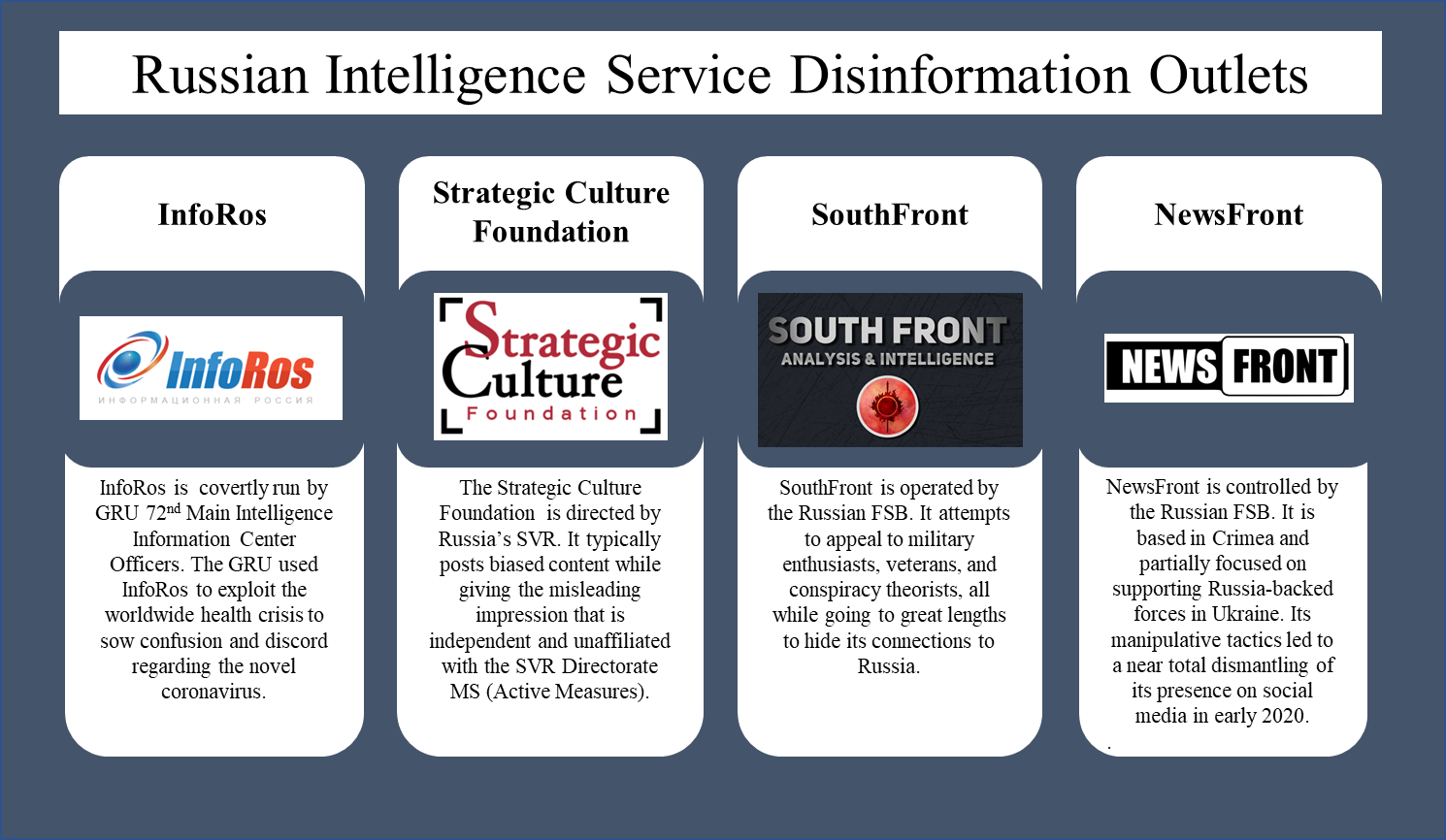 The US Treasury Department statement clearly states that online media platforms controlled by the “Russian Intelligence Services, namely the Federal Security Service (FSB), the Main Intelligence Directorate (GRU), and the Foreign Intelligence Service (SVR), play critical roles in propagating Russian disinformation online.”
The US Treasury Department statement clearly states that online media platforms controlled by the “Russian Intelligence Services, namely the Federal Security Service (FSB), the Main Intelligence Directorate (GRU), and the Foreign Intelligence Service (SVR), play critical roles in propagating Russian disinformation online.”
The new US sanctions follow a detailed State Department report published in 2020 about the Russian government’s disinformation ecosystem, which includes most of the platforms included in the US sanctions announcement. Additionally, it included a Canadian platform, Globalresearch.ca thatis run by a former University of Ottawa professor.
The Russian intelligence controlled platforms – Strategic Culture, SouthFront, NewsFront and Inforos – publish content that promotes “divisive issues in the United States, denigrate U.S. political candidates, and disseminate false and misleading information.”
The Treasury Departments states that Strategic Culture Foundation (SCF), an online pseudo-academic journal, “is controlled by the SVR’s Directorate MS (Active Measures) and created false and unsubstantiated narratives concerning U.S. officials involved in the 2020 U.S. presidential election.”
Strategic Culture has targeted both Canadian Liberal and Conservative governments and MPs in equal measure. A search of stories on the website brings up several stories about Chrystia Freeland, with claims that the Deputy Prime Minister is personally “ruining” Russia-Canada relations. Other articles promote the Russian Foreign Ministry narrative that seeks to discredit Freeland as a defender of Nazis (a disinformation narrative used by the Kremlin since the Cold War to broadly discredit and delegitimize the Baltic and Ukrainian communities in Canada).
The government of Stephen Harper was not spared by the Russian intelligence platform: “by all measures of governing standards, the Conservative government of Canada’s Prime Minister Stephen Harper embodies the same racist policies as that of the governments of the former Rhodesia and apartheid South Africa.”
Another piece, written by an author who is featured on a far-left Canadian platform called The Canada Files, claims that the Harper government was controlled by neo-Nazis in order to discredit his government’s foreign policy. Another article blasting Canada’s Segei Magnitsky human rights sanctions law claims Stephen Harper was “blindly following the demands of rabid representatives of the Ukrainian diaspora in Canada.”
Among the broader Russian intelligence disinformation narratives broadcast by Strategic Culture authors are stories that the Baltic States and NATO are threatening Russia with war.
The disinformation and propaganda published by Strategic Culture is intended to undermine our democracies, polarize our societies and erode trust in our elected officials, media and each other. During the COVID pandemic, the Russian government has intensified these efforts by amplifying and promoting anti-lockdown and anti-mask narratives and movements.
Content posted on the SVR-controlled Strategic Culture is cross posted to the FSB controlled SouthFront. An article by one Canadian repeats the Kremlin’s campaign to discredit Chrystia Freeland and the entire Ukrainian Canadian community while mocking Canada’s then Foreign Minister, calling her the “Regime Change Princess of Ukraine and Venezuela.” The overall content on SouthFront can be characterized as anti-NATO and supportive of totalitarian and authoritarian regimes that engage in mass human rights abuses.
According to the Treasury Department, “SouthFront is an online disinformation site registered in Russia that receives taskings from the FSB.” The platform, which is designed to appeal to conspiracy theorists and military veterans and enthusiasts, promoted narratives about voter fraud in the 2020 US presidential election.
NewsFront, the third Russian intelligence media platform sanctioned by the US, was set up in Russian occupied Crimea and its content is directed by the FSB. According to the Treasury Department statement, “NewsFront was also used to distribute false information about the COVID-19 vaccine,” and to undermine “the credibility of a news website advocating for human rights.”
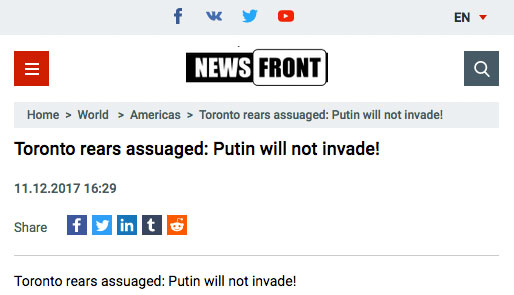
In 2017, News Front, posted a story about DisinfoWatch’s director Marcus Kolga, the Macdonald-Laurier Institute (MLI), and MLI Senior Fellow Shuvaloy Majumdar. To discredit a piece written by Marcus Kolga that was critical of Vladimir Putin, the author of the NewsFront piece produces a litany of bizarre, unsubstantiated claims: “Kolga turned truth on its head in this fairytale. For one thing, he’s failed to mention Georgian snipers killing off both sides in Maidan Square just as U.S. Senator John McCain looked on from the luxury box. He’s also failed to mention the massive smear campaign waged on Russia before Sochi began, a PR campaign I analyzed back when. And, he’s left off “Fuck the EU”, MH17 being diverted so it could be shot down.”
China’s Campaign on the Canadian Sanctions and the Xinjiang Genocide
On March 22, 2021, the Canadian government announced that Canada will apply sanctions on four Chinese officials and one entity for gross human rights violations against Uyghurs and other ethnic minorities in Xinjiang. This latest development has signalled a dramatic shift in approach to China from Canada.
The sanctions, which Canada is applying in coordination with the United States and the United Kingdom, come amid multiple reports, studies and news articles detailing the horrific mistreatment and abuse China’s Uyghur population has been subjected to in the Xinjiang region. This has sparked a flurry of social media activity and campaigns to discredit the sanctions byChinese officials.
The Chinese Communist Party (CCP) has engaged in campaigns to discredit reports of atrocities against Uyghurs and other ethnic nationalities in Xinjiang. In 2019, after official government documents were leaked to various media outlets, the Associated Press reported that the Xinjiang regional government began deleting data, destroying documents, tightening controls on information and has held high-level meetings in response to leaks.
In a statement on their website, the Chinese Embassy in Ottawa condemned Canada for the sanctions. The statement notes Canada’s historical treatment of Indigenous peoples. Additionally, the statement points out that Indigenous communities are still under boil water advisories. The Chinese Embassy also highlights anti-Asian violence that has increased during the COVID-19 pandemic. The statement asserts that Canada is not qualified to act as a “teacher” on human rights issues and ultimately, Canada should not criticize China. Zhao Lijian, the deputy director of the Chinese Ministry of Foreign Affairs Information Department, also tweeted out an infographic about murdered Indigenous women in Canada.
To be clear, Indigenous peoples have suffered immensely under the residential school system and Canada continues to reckon and struggle with reconciliation.
Additionally, Canadian media has reported a surge in anti-Asian violence since the the start of the pandemic. Canadian politicians and activists have expressed their concerns and Public Safety Minister Bill Blair has raised concerns in his testimony to the Special Committee of Canada-China relations.
The Chinese Communist Party launched a propaganda blitz in an effort to discredit reports on Xinjiang. A report by the Uyghur Human Rights Projects tracked Beijing’s social media and state-controlled outlets activity related to Xinjiang just as increasing evidence of detention camps emerged. Beijing has also shifted its propaganda strategy on Xinjiang. Initially, Beijing outright denied the existence of the detention camps, however they have since shifted to justifying these camps as voluntary “vocational training” camps.
However, the Chinese Embassy’s statement reveals a broader strategy now being employed by Chinese officials. Zhao Lijian, the deputy director of the Chinese Ministry of Foreign Affairs Information Department, tweeted out an infographic about murdered Indigenous women in Canada. This approach relies heavily on a Soviet style “whataboutism” tactic to deflect any responsibility of the ongoing genocide in Xinjiang. As well, the Chinese government appears to be deploying the same strategy against the other sanctioning countries. Chinese state media Global Times tweeted one graphic that blamed the EU for the Holocaust, Finnish parliamentary racism, and the gender pay gap in Luxembourg.
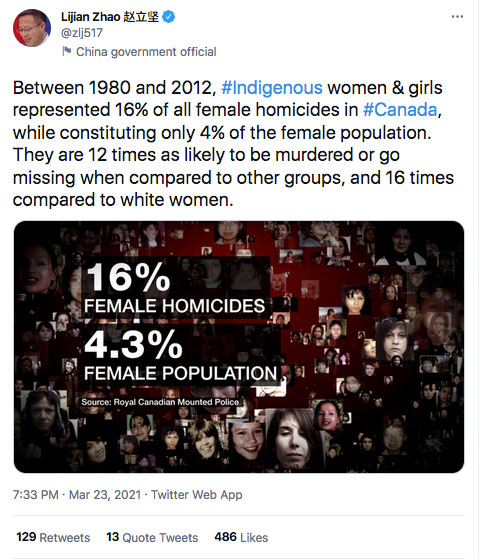 Russian Government Holds Global News Development Seminar for Compatriots
Russian Government Holds Global News Development Seminar for Compatriots
The Russian government compatriots program, known as Russkiy Mir, recently hosted a global seminar about how to support, report on and advance Russian government narratives in the global media. According to a report by a participant organization, one of the participants was Alexander Kornilov, a publisher of a Kremlin controlled Baltic news portal, Baltnews. Baltnews has been identified as spreading disinformation on behalf of the Russian government in the Baltic States.
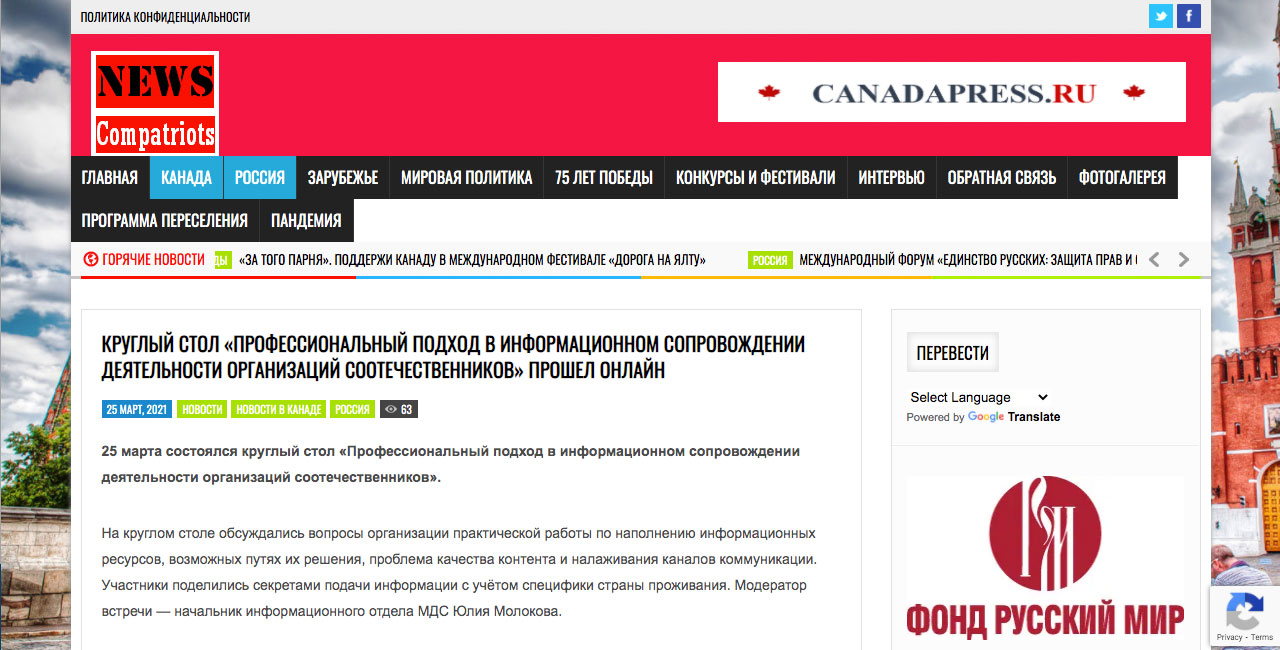 The report, published on “canadapress.ru,” states that during the meeting “participants shared the secrets of presenting information, taking into account the specifics of the country of residence.” The participants, which included members of the Russian community in Canada, reportedly discussed how to professionally publish information in coordination with the Russian government.
The report, published on “canadapress.ru,” states that during the meeting “participants shared the secrets of presenting information, taking into account the specifics of the country of residence.” The participants, which included members of the Russian community in Canada, reportedly discussed how to professionally publish information in coordination with the Russian government.
Radical Pro-Kremlin Extremists Organize Estonian Anti-Lockdown Protests
Estonian investigative journalist, Martin Laine, has published several reports about highly coordinated, escalating anti-lockdown protests in Estonia. Protestors claim that government lockdown regulations have created a “prison state.” Several provocations have taken place in public places where maskless groups confront security guards and police with cameras in hopes of causing a physical confrontation.
According to Laine’s report for Estonia’s leading weekly magazine, Eesti Ekspress, the leaders of these groups are individuals connected to radical pro-Kremlin nationalists, who were involved in the 2007 Bronze Soldier riots. These riots were coordinated with the Russian embassy in Tallinn to destabilize the country and were followed by massive Russian government cyber attacks against the Estonian government, media and banks.
The Russian leaders of the Estonian anti-lockdown protests also undertook an email campaign to spam the inboxes of Estonian MPs with 800,000 emails. The action, which has bogged down government servers, is being characterized as a “cyber attack.”
The protests, which seem to be linked to pro-Kremlin groups, are similar in tone and nature to those being organized in other countries, including in Canada.
Several western intelligence agencies have warned that China and Russia are using the COVID pandemic to promote disinformation and polarize societies. The extremely polarizing nature of anti-lockdown and anti-mask narratives is attractive to malign regimes, who have helped amplify them via official state channels, like Russia’s RT in Canada.
Rebel Rebel
Russian government global media platform RT reported that employees working for the far-right Canadian media platform, The Rebel, had been arrested in Montreal. The RT headline identifies The Rebel as being a “lockdown-skeptic” outlet.
According to CTV News, Montreal police were sent to a boat, allegedly rented by The Rebel, to break up a gathering that exceeded the maximum number of people allowed in a public gathering.
The rights of Canadians to protest government policies are protected by Canadian law and government COVID restrictions deserve vigorous debate. However, media should be aware that RT and other fringe and conspiracy theory platforms that align with the Kremlin have a clear strategy to aggressively promote anti-mask, anti-vaccination and anti-lockdown narratives during the COVID pandemic. In March 2020, the European Union warned that Russia would seek to intensify the negative effects of the pandemic in Western nations.
